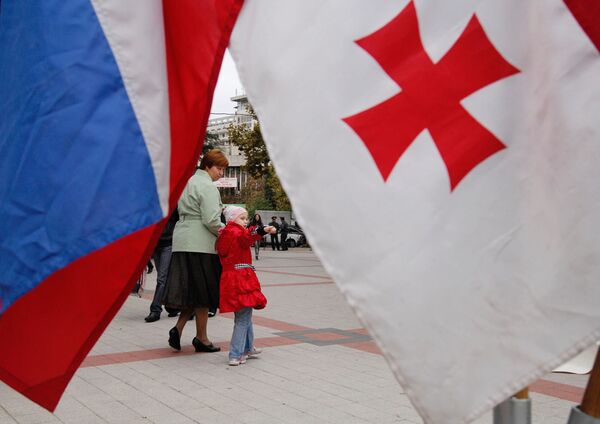The first cultural, economic and political ties between Georgia and Kievan Rus date back to the 12th century. Both Orthodox Christian states, they established regular relations in the 16th-18th centuries. Georgian rulers requested Russian military assistance, advocating joint operations against Turkey and Persia. Diplomatic and cultural ties became more intense in the late 17th century, as a result of which a Georgian community was created in Moscow.
At the end of the 18th century, Eastern Georgia was controlled by Persia. The kingdom of Kartli and Kakheti (Eastern Georgia) and the kingdom of Imereti sided with Russia during the 1768-1774 Russo-Turkish War. The Russian victory made things easier for the Turkish-ruled Georgian territories. Notably, the kingdom of Imereti (Imeretia) stopped paying tribute to the Turkish Sultan.
On December 21, 1782, Irakly II (or Erekle II), the king of Kartli and Kakheti, asked Empress Catherine the Great to accept Georgia as a Russian protectorate. The Empress, who wanted to strengthen Russian positions in the South Caucasus, agreed. A bilateral treaty was signed on July 24 (August 4), 1783, at the Georgiyevsk fortress in the North Caucasus. Under the document, the Georgian King recognized Russia’s supreme authority and protectorate. In turn, Russia guaranteed the territorial integrity of his possessions and those of the King’s heirs. The kingdom of Kartli and Kakheti pledged to coordinate its foreign policy with Russia in advance. The treaty formalized the Georgian state’s independence in tackling all its domestic policy issues, and Article 7 made it incumbent on Georgia to provide mutual military assistance to Russia whenever necessary.
In order to bolster the defense capabilities, Russia pledged to permanently station two infantry battalions in Georgia and to provide additional assistance in case of war. However, Turkey demanded that Russia annul the Treaty of Georgiyevsk. Consequently, Russian forces were withdrawn from Georgia in 1787.
That same year, Turkey declared war on Russia with the support of Great Britain, France and Prussia. The Russo-Turkish War of 1787-1792 ended with Russia’s overwhelming victory. The bilateral Peace Treaty of Jassy reinstated the Treaty of Georgiyevsk.
In an effort to retain power, King Georgy XII (or George XII), who succeeded Irakly II, asked Russian Emperor Paul I to admit Georgia on the condition that his descendants be allowed to remain on the throne. Soon after the death of Georgy XII, Paul I signed a manifesto on incorporating Georgia into Russia on January 18 (30), 1801. The document referred to the kingdom of Kartli and Kakheti as the Georgian Kingdom for the first time.
The Russian Empire subsequently incorporated other regions now comprising independent Georgia. This was primarily accomplished as a result of its wars against Turkey and Persia. Georgia was actively involved in the Russo-Iranian wars in 1804-1813 and 1826-1828, as well as the 1806-1812 and 1828-1829 Russo-Turkish wars, and regained most of its lost territories. Imeretia, Guria, Svanetia and Mingrelia joined Russia in 1810, 1828, 1854 and 1857, respectively.
Georgia’s involvement in the economic life of Russia, which had embarked on the road of capitalist development, facilitated socio-economic progress. Georgia overcame its political and economic disunity. The Georgian nation established closer cultural ties with the Russian nation and other ethnic groups in the Russian Empire.
However, the Russian government’s colonial policy led to peasant insurrections, the largest being the 1841 Guria uprising and the 1857 Mingrelia uprising.
Georgia posted rapid economic growth in the second half of the 19th century. This was, however, accompanied by mass protests against national and social oppression.
On March 9/22, 1917, the Transcaucasian Commissariat, a body of the Russian Provisional Government, was set up in Tiflis during the February Bourgeois Democratic Revolution. On November 15/28, 1917, the Transcaucasian Commissariat was established as a body of the Transcaucasian Menshevik Government, to be dissolved in March 1918. In addition, Georgian military units and the National Guard were formed. On May 26, 1918, the Mensheviks proclaimed Georgia an independent republic. In May and early June 1918, German forces entered Georgia at the request of the Menshevik government. Turkish forces subsequently entered the country. They were replaced by British troops in December 1918, which remained in Georgia until July 1920.
In 1921, the Bolsheviks staged an armed rebellion, overthrew the Menshevik government with the Red Army’s assistance and established Soviet power in Georgia.
Established on February 25, 1921, the Georgian Soviet Socialist Republic was part of the Transcaucasian Federation from March 12, 1922, and joined the Soviet Union as an independent republic on December 5, 1936.
Georgia implemented industrialization and collectivization programs during the Soviet period, creating entire new industry sectors.
The March 31, 1991 referendum proclaimed Georgia an independent state. On April 9, 1991, the Supreme Soviet (Parliament) of the Republic of Georgia passed an act reinstating Georgia’s independence.
Russia and Georgia established diplomatic ties on July 1, 1992.
The two countries have signed over 90 inter-state and intergovernmental agreements. The bilateral framework treaty on friendship, good-neighborliness, cooperation and mutual security was considered in 2001-2005. The discussion of the document has now been suspended.
Anti-Russian aspects of Tbilisi’s foreign policy linked with plans for settling conflicts in Abkhazia and South Ossetia by force have hindered constructive bilateral relations in the past few years.
In the early hours of August 8, 2008, Georgian troops attacked South Ossetia and damaged part of its capital, Tskhinval. In an effort to protect South Ossetians, many of whom had Russian citizenship, Russia deployed its forces in the republic and expelled Georgian military units from the region in the next five days.
On August 26, 2008, Russia recognized the independence of South Ossetia and Abkhazia. On September 2, 2008, Georgia decided to sever diplomatic ties with Russia.
Georgia’s foreign policy priorities are currently based on its “European destiny.” Tbilisi’s policy aims at the closest possible rapprochement with the European Union and fastest possible integration into NATO.



